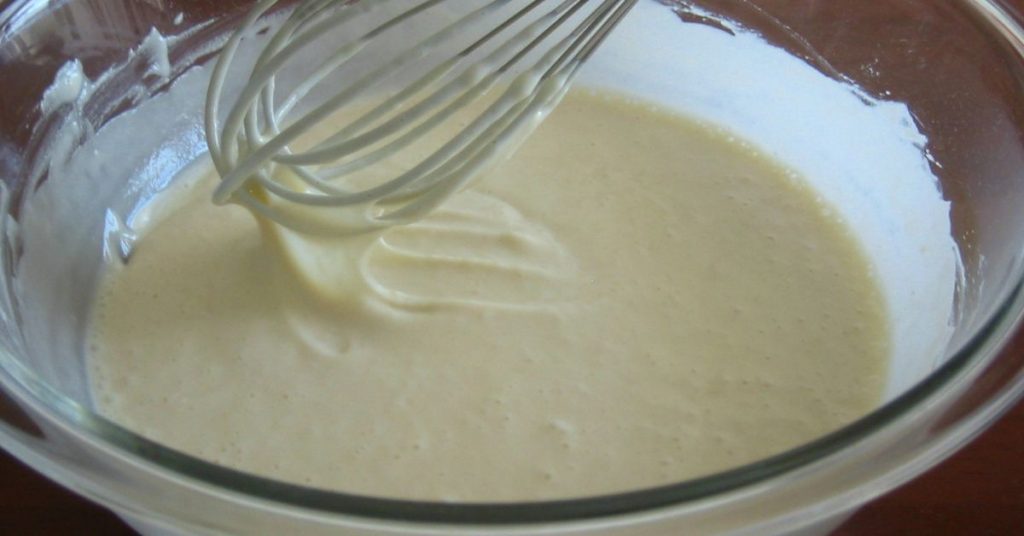Refrigerating & Resting Crepe Batter: All You Need to Know!


Getting the crepe batter right is the primary condition for delicious crepes. Although crepe batter is very simple to make, it takes some knowledge to make it right. In addition to getting the right consistency and thickness, you also need to leave the batter to rest for a while before you pour the crepes into the pan. So here’s all you need to know about refrigerating and resting crepe batter.
The crepe batter needs to rest for a minimum of 30 minutes before baking the crepes. Left in the fridge, the batter is good for two days, but not longer. Refrigerated crepe batter is even better, as the cold helps the molecules stabilize, resulting in more elastic and non-sticky crepes.
The resting of the crepe batter is a commonly omitted element of crepe making. Most people bake the crepes right after they make the batter, and though the crepes may turn out good, they will turn out perfect if the batter is left to rest for a while. In the following text, I will explain why it is so important to leave the batter to rest, how long should the resting period be, and how to store the crepe batter.
How Long Does the Crepe Batter Need to Rest?
The crepe batter needs to rest for at least 30 minutes after making it. Once your crepe batter is done, cover it with plastic foil and leave it aside for a minimum of 30 minutes.
If you want to overnight it, leave it in the fridge for no more than two days. Before scooping the batter and pouring it into the pan, make sure you give it a nice and thorough mix with a spoon, not a mixer, to merge the solids and liquids that might have separated during the resting process.
Why Rest Crepe Batter?
Before I elaborate on the reasons why crepe batter should rest, I must first stress that if the batter doesn’t rest, the crepes will still be ok, but just ok. Also, there’s a risk that they may stick to the pan, although you’ve made everything as you should.
Now, the batter needs to rest because the molecules of the ingredients need to relax and bond. Since crepes are made with flour, it means that the batter contains gluten, which needs to set before it is thermally processed.
Just like the dough needs to be leaven or set, the same goes for the crepe batter, too, as it contains flour. Resting allows for the batter to stabilize, which will result in stable crepes which are easy to work with and easy to shape.
During the resting process, the flour absorbs the liquid ingredients, and the batter further homogenized.
What Happens If You Don’t Leave the Crepe Batter to Rest?
Not leaving the crepe batter to rest won’t be the end of the world, but you will risk having sticky crepes that will likely fall apart on the first roll.
The crepes are meant to be garnished with something, so you either roll them or fold them. Therefore they need to hold their consistency to support the filling. Resting gives crepes the stability they need, and not letting them rest could result in runny, inconsistent batter, which will give you less than good crepes.
Should You Keep Crepe Batter in the Fridge to Rest?
In essence, refrigeration isn’t necessary for the crepe batter to rest, as the cold temperature doesn’t affect the process itself. You can leave your crepe batter to rest on the counter for two hours, and it will rest just fine.
Refrigeration of the crepe batter is necessary if you intend to leave it overnight or for more than a couple of hours. This isn’t to let the batter rest better but to keep it safe, as it contains raw eggs and milk, which are highly perishable.
Although the low temperature doesn’t affect the resting process directly, as the batter would rest perfectly outside the fridge, too, it does help it stabilize. Therefore leaving the batter in the fridge is definitely a good idea.
How to Store Crepe Batter?
If you indent to bake the crepes later than two hours after making them, it is best to leave the batter in the bowl where you made it and cover it with a plastic foil.
On the other hand, if you are planning to bake the crepes in more than a few hours, it is best to pour the batter into another container, preferably airtight. All airtight containers would do, but a metal container would be best if you have one.
How Long Does the Crepe Batter Last?
Outside the fridge, crepe batter is good for up to two hours. It could hold up to two days if stored correctly in the fridge in an airtight container.
In essence, crepe batter is highly perishable, mainly because of the raw eggs it contains. The eggs combined with the milk, topped off with the flour, is a combination with a very short shelf-life.
Just to be safe, before cooking the crepes, check to see if your batter is good. Safe batter smells like eggs and butter, and spoiled batter smells like cheese. No matter how subtle the cheesy smell is, do not cook with this batter.
It will also change color, somewhere between eggshell and light pink, and it will start bubbling on the surface. The bubbles will be larger than the ones naturally forming on the batter’s surface.
Should Crepe Batter Be Runny?
Between creamy and liquid, crepe batter should be more on the liquid side. However, the crepe batter consistency should not be watery but significantly thicker.
It should be pourable but not very drippy. For example, pancake batter is thicker than crepe batter. Crepe batter consistency most resembles that of heavy cream but is a bit thinner.

How Long Do Crepes Last at Room Temperature?
Crepes cold last up to four-five hours at room temperature, after which you should refrigerate them if you haven’t finished them.
Crepes tend to get dry after a few hours, so they are best when served freshly made. Their edges become hard and crunchy, so with each passing hour, they become more difficult to roll or fold.
They don’t do too well in the fridge either, though the low temperature prolongs their shelf life, so they will be safe for two to three days. When refrigerating crepes, see that you stack them on each other with no separators between them so that they can draw moisture from each other.
Don’t worry about separating them afterward, as the cold will make them more stable and easier to separate.
Can You Freeze Crepes?
Generally, freezing crepes isn’t the first thing you want to do. They are very fragile and will become very brittle when frozen. Defrosting crepes isn’t a picnic either, and they will in no case be as good as before freezing.
However, freezing crepes isn’t impossible, but you need to handle them with care. Seal them tightly in containers that aren’t much larger than the crepes, as you need to reduce the air inside the container as much as possible.
Crepes frozen this way will be good for up to three months.
